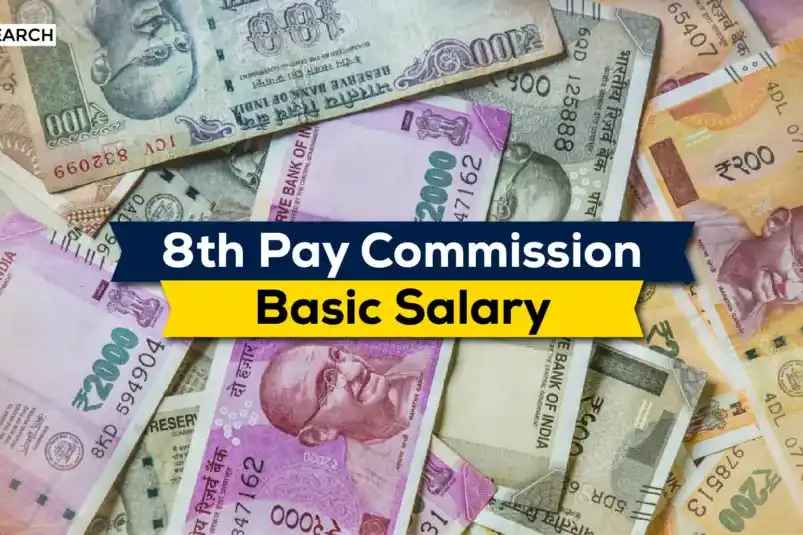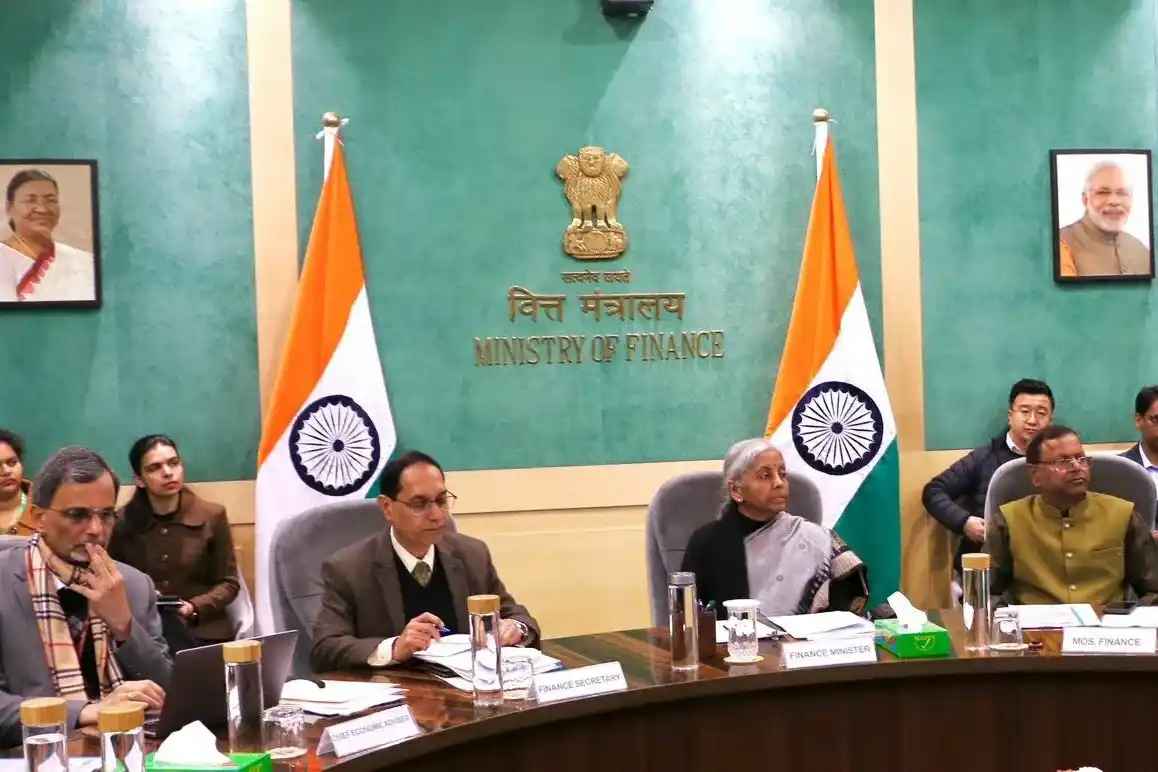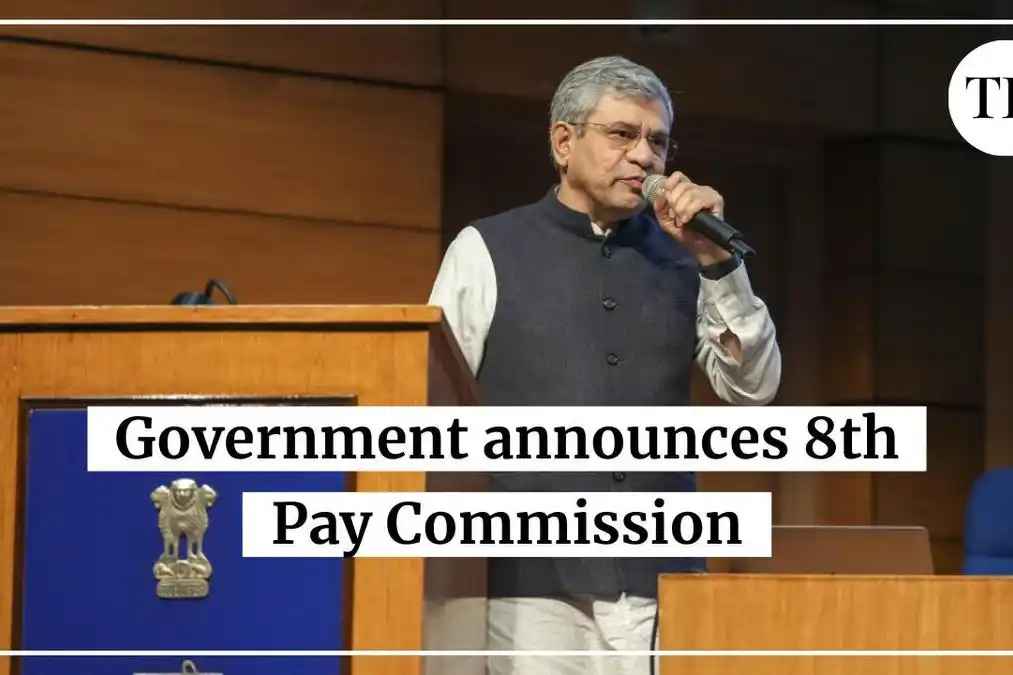8th Pay Commission: Objectives, Salary Revisions, and Impact on Government Employees
Updated on : 17 January, 2025

Image Source: cloudfront.net
Introduction
The establishment of the 8th Pay Commission marks a significant milestone for central government employees in India. Its primary aim is to review and update the salary structures, allowances, and benefits for government employees and pensioners, ensuring they are reflective of the current economic landscape and inflation rates. The specific objectives include:
- Adjusting Salaries: To provide equitable compensation that aligns with the increasing cost of living.
- Revising Allowances: To ensure that allowances, such as House Rent Allowance (HRA) and Transport Allowance, are sufficient.
- Pension Revisions: To enhance pension schemes for retirees, promoting financial security in their post-service lives.
Historical Context of Pay Commissions
In India, pay commissions have been instituted approximately every ten years to assess and recommend modifications to the pay structure for government employees. The last commission, the 7th Pay Commission, was implemented in January 2016 and brought about substantial changes to salary structures. Given the economic shifts since then, there has been a growing demand among employees for the formation of the 8th Pay Commission.
Formation of the 8th Pay Commission

Image Source: vakilsearch.com
Composition and Structure
The 8th Pay Commission will be formed by a diverse panel of experts, including economists, administrative officials, and representatives from employee unions. This varied composition is designed to ensure that multiple perspectives are taken into account during the decision-making process. The inclusion of different stakeholders will facilitate a comprehensive review of the current pay structures, allowances, and benefits for central government employees and pensioners. Such diversity aims to create balanced recommendations that address the needs and expectations of all parties involved, ultimately leading to fair compensation aligned with contemporary economic conditions.
Appointment of Members
The appointment of members to the 8th Pay Commission will be a crucial step in its formation. The government is expected to select qualified individuals who possess a deep understanding of public service and economic policies. These appointments will likely follow thorough discussions within the cabinet to ensure that the chosen members can effectively represent various interests. The commission will include a chairperson and two additional members, tasked with leading the review process. Timely appointments will be essential to facilitate a smooth operation and allow for adequate time to gather recommendations before the commission's implementation in January 2026.
Terms of Reference
Mandate and Scope of Work
The 8th Pay Commission will have a comprehensive mandate focused on evaluating the current pay structure for central government employees. Its primary responsibilities will include assessing the impact of inflation on salaries and recommending necessary adjustments. The scope of work will cover several critical areas:
- Salary Revisions: Analyzing and proposing changes to the existing salary framework.
- Allowances: Reviewing various allowances to ensure they meet current economic needs.
- Pension Structures: Evaluating pension schemes to enhance financial security for retirees.
- Other Benefits: Assessing additional benefits provided to government employees to ensure competitiveness.
Key Areas of Focus
The commission's key areas of focus will likely include several essential components:
- Fitment Factor Adjustments: Determining a fair multiplier for calculating salaries, ensuring equitable compensation.
- Minimum Salary Recommendations: Establishing a minimum salary that accurately reflects the cost of living and inflation.
- Revisions in Allowances: Ensuring allowances are competitive and adequate to support government employees effectively.
For more information on the Pay Commission's structure and updates, you can visit the page here.
Popular Blogs
Salary Structure Revisions
Proposed Changes to Basic Pay
One of the most anticipated aspects of the 8th Pay Commission is the proposed changes to basic pay. Current discussions indicate a potential increase in the minimum basic salary from ₹18,000 to approximately ₹34,560, reflecting necessary adjustments based on inflation. This significant rise would enhance the financial stability of central government employees, ensuring their compensation aligns with current economic conditions. Reports suggest that if the fitment factor is set at around 2.86, it could lead to a substantial increase in salaries, benefiting nearly 50 lakh employees and 65 lakh pensioners across India.
Expected Minimum Basic Salary Table
| Pay Matrix Level | Basic Salary (7th CPC) | Basic Salary (8th CPC) |
|---|---|---|
| Level 1 | Rs.18,000 | Rs.21,600 |
| Level 2 | Rs.19,900 | Rs.23,880 |
| Level 3 | Rs.21,700 | Rs.26,040 |
| Level 4 | Rs.25,500 | Rs.30,600 |
| Level 5 | Rs.29,200 | Rs.35,040 |
| Level 6 | Rs.35,400 | Rs.42,480 |
| Level 7 | Rs.44,900 | Rs.53,880 |
| Level 8 | Rs.47,600 | Rs.57,120 |
| Level 9 | Rs.53,100 | Rs.63,720 |
| Level 10 | Rs.56,100 | Rs.67,320 |
| Level 11 | Rs.67,700 | Rs.81,240 |
| Level 12 | Rs.78,800 | Rs.94,560 |
| Level 13 | Rs.1,23,100 | Rs.1,47,720 |
| Level 13A | Rs.1,31,100 | Rs.1,57,320 |
| Level 14 | Rs.1,44,200 | Rs.1,73,040 |
| Level 15 | Rs.1,82,200 | Rs.2,18,400 |
| Level 16 | Rs.2,05,400 | Rs.2,46,480 |
| Level 17 | Rs.2.25 lakh | Rs.2.70 lakh |
| Level 18 | Rs.2.50 lakh | Rs.3 lakh |
Fitment Factor Adjustments
The fitment factor plays a crucial role in determining salary calculations across different levels within the government. Expectations indicate that this factor may be set between 2.28 and 3.0, which would significantly impact overall salary calculations. For instance, if the fitment factor is approved at 2.86, the minimum salary for government employees could rise dramatically to ₹51,480 from the current ₹18,000. This adjustment not only affects salaries but also pensions, with potential increases for retirees as well. The final determination of the fitment factor will be essential for establishing equitable compensation structures in line with economic realities.
Fitment Factor for the 8th Pay Commission
| Pay Commission | Hike in Pay (%) | Fitment Factor | Minimum Basic Salary |
|---|---|---|---|
| 4th Pay Commission | 27.6% | – | Rs.750 |
| 5th Pay Commission | 31% | – | Rs.2,550 |
| 6th Pay Commission | 54% | 1.86 | Rs.7,000 |
| 7th Pay Commission | 14.29% | 2.57 | Rs.18,000 |
| 8th Pay Commission | 20% (expected) | 3.00 (expected) | Rs.21,600 (expected) |
Allowances and Benefits
Overview of Revised Allowances
Revisions in allowances will be a critical aspect of the 8th Pay Commission's recommendations. Key adjustments are expected in the following areas:
- House Rent Allowance (HRA): To reflect rising housing costs.
- Transport Allowance: To accommodate increased fuel prices and commuting expenses.
- Medical Allowance: To ensure adequate healthcare support for employees.
These revisions aim to ensure that allowances accurately reflect current living conditions and economic circumstances, thereby enhancing the overall benefits for government employees.
Impact on House Rent Allowance (HRA) and Transport Allowance
With the continuous rise in housing costs, an increase in HRA is anticipated to provide better support for employees. Similarly, adjustments to transport allowances are likely to be made to address the escalating costs of fuel and commuting. These changes are crucial for maintaining the purchasing power of government employees, ensuring that their allowances keep pace with inflation and the overall cost of living. The commission's recommendations will play a significant role in improving financial stability for both current employees and retirees.
Comparative Analysis with Previous Commissions
Key Differences from the 7th Pay Commission
The 8th Pay Commission is expected to address several anomalies identified in the recommendations of the 7th Pay Commission. One significant difference will be its focus on correcting disparities in salary structures across various levels of government employees. Unlike its predecessor, the 8th Commission aims to provide a more equitable distribution of salaries, ensuring that similar roles receive comparable compensation. Additionally, it will likely incorporate feedback from employee unions to enhance the inclusivity of its recommendations, thereby fostering a more transparent and fair pay structure for all government employees.
Lessons Learned from Past Recommendations
Past commissions have underscored the importance of timely implementation and regular reviews of pay structures to keep pace with economic changes. The 8th Pay Commission aims to incorporate these lessons into its framework by establishing mechanisms for periodic assessments and adjustments. This proactive approach is intended to prevent the accumulation of discrepancies that often arise due to inflation and changing living costs. By learning from previous experiences, the 8th Commission seeks to create a sustainable pay structure that not only meets current needs but also anticipates future economic conditions, ensuring long-term financial stability for government employees.
Impact on Government Employees

Image Source: mathrubhumi.com
Expected Salary Increases
Government employees can anticipate significant salary increases under the new commission's recommendations. Projections suggest an increase ranging from 20% to as high as 35%, depending on final decisions regarding the fitment factor. If the fitment factor is set at approximately 2.28, the minimum basic salary could rise to around ₹34,560, significantly enhancing the financial well-being of employees. This anticipated increase is expected to provide relief amid rising inflation and cost-of-living challenges, benefiting nearly 50 lakh central government employees.
Changes in Pension Structures
Pensioners are also expected to benefit from revisions, with projected increases aimed at ensuring retirees maintain a comfortable standard of living post-employment. The minimum pension may rise to approximately ₹17,280, reflecting adjustments based on inflation and economic conditions. These changes are crucial for providing financial security to retirees, allowing them to cope with rising living expenses effectively. Overall, the revisions in both salaries and pensions are designed to enhance the financial stability of government employees and pensioners alike.
Implementation Timeline
Proposed Schedule for Recommendations
While specific dates remain speculative, there is an expectation that the 8th Pay Commission's recommendations could be finalized by late 2025. Following this, the implementation is targeted for January 2026. This timeline aims to ensure that government employees and pensioners receive timely adjustments to their salaries and benefits, reflecting the current economic conditions. The commission's work will involve thorough assessments and consultations to create a comprehensive report that addresses the needs of all stakeholders.
Phased Implementation Strategy
To manage budgetary implications, a phased implementation strategy may be adopted for the recommendations. This approach allows for gradual adjustments over time rather than a sudden overhaul of the pay structure. By implementing changes in phases, the government can better assess financial impacts and make necessary adjustments as needed. This strategy not only ensures a smoother transition but also helps mitigate potential budgetary strains, allowing for a more sustainable approach to enhancing the compensation and benefits of government employees and pensioners.
Stakeholder Consultations
Engagement with Employee Unions and Associations
Consultations with employee unions and associations will play a vital role in shaping the 8th Pay Commission's recommendations. Engaging these stakeholders ensures that the concerns and needs of employees are adequately addressed in the decision-making process. By involving representatives from various unions, the commission can gain valuable insights into the specific challenges faced by government employees, allowing for more informed and equitable recommendations. This collaborative approach aims to foster trust and transparency between the government and its workforce.
Feedback Mechanisms and Public Input
To further enhance inclusivity, the commission may establish feedback mechanisms that allow employees to voice their opinions on proposed changes before final recommendations are made. These mechanisms could include surveys, public forums, or online platforms where employees can share their views and suggestions. By incorporating public input, the commission can ensure that its recommendations reflect a broad spectrum of perspectives, ultimately leading to more effective and accepted outcomes. This commitment to stakeholder engagement underscores the importance of collaboration in developing a fair and sustainable pay structure for government employees.
Financial Implications

Image Source: upstox.com
Budgetary Considerations for Implementation
The financial implications of implementing the 8th Pay Commission's recommendations will be significant. The government must carefully evaluate its budgetary capacity to accommodate potential increases in salaries and pensions. Implementing substantial salary hikes, projected to range from 20% to 35%, could place considerable strain on government finances, especially if executed immediately. Historical data indicates that previous pay commissions, such as the 7th Pay Commission, added financial burdens of over ₹1.02 lakh crore to the exchequer in their initial fiscal year. Therefore, a thorough assessment of fiscal sustainability is essential before proceeding with any changes.
Economic Impact Analysis
An economic impact analysis will be necessary to understand how these changes might affect overall economic conditions, including inflation rates and public spending. While increasing disposable income for government employees could stimulate economic activity, it may also lead to inflationary pressures if not managed properly. The balance between enhancing employee compensation and maintaining economic stability will be crucial. Additionally, a careful examination of how these salary adjustments could influence public spending patterns and overall economic growth is vital for informed decision-making.
Public Response and Reactions

Image Source: th-i.thgim.com
Employee Sentiment and Expectations
There is a palpable sense of anticipation among government employees regarding the upcoming 8th Pay Commission. Many express hope for substantial increases that reflect their contributions to public service. With nearly 1.2 crore central government employees and pensioners eagerly awaiting the commission's formation, the sentiment is one of urgency and expectation. Recent discussions have highlighted demands for a fitment factor that could lead to significant salary hikes, with unions advocating for increases ranging from 30% to 35%. This optimism is tempered by recent government statements indicating that there is currently no proposal under consideration for the commission's establishment, leading to disappointment among employees.
Media Coverage and Public Discourse
Media coverage surrounding the formation of the commission has been extensive, reflecting public interest in how these changes will impact government workers across India. Reports have detailed the ongoing campaigns by employee unions urging the government to prioritize the establishment of the 8th Pay Commission, especially in light of rising living costs and inflation. The discourse has also included discussions about potential alternatives to a traditional pay commission, with suggestions for new mechanisms to ensure timely salary revisions. Overall, the media's focus on this issue underscores its significance and the widespread concern among government employees regarding their financial future.
Challenges and Controversies
Opposition from Various Sectors
While there is considerable support for the establishment of the 8th Pay Commission, opposition may arise from various sectors concerned about budgetary constraints and differing priorities within government spending. Critics argue that substantial salary increases could strain public finances, especially in a context of rising fiscal deficits and economic uncertainty. Some stakeholders may advocate for reallocating funds to other critical areas, such as infrastructure development or social welfare programs, rather than increasing salaries for government employees. This divergence in priorities could lead to heated debates within the government and among the public, complicating the commission's formation and recommendations.
Legal and Administrative Hurdles
Navigating legal frameworks related to salary adjustments can present significant challenges for the 8th Pay Commission. The implementation of revised pay structures must comply with existing laws and regulations, which can vary across different states and departments. Additionally, administrative hurdles may arise in coordinating changes across various government sectors, requiring careful planning and communication. Ensuring that all stakeholders are aligned and that the implementation process is smooth will be essential to avoid delays or disputes. The commission will need to develop a clear strategy to address these legal and administrative complexities while effectively managing the expectations of employees and pensioners.
Future Projections
Long-term Effects on Government Finances
The long-term effects of implementing new pay structures under the 8th Pay Commission could significantly impact government finances, necessitating ongoing assessments post-implementation. With anticipated salary increases ranging from 20% to 35%, the financial burden on the government could be substantial, influencing budget allocations for essential services. Continuous evaluations will be crucial to ensure that these increases do not lead to unsustainable fiscal deficits or hinder public investment in critical areas such as infrastructure and social welfare.
Predictions for Future Pay Commissions
Looking ahead, future pay commissions may need to adopt more flexible approaches to effectively address rapidly changing economic conditions compared to previous models. As inflation rates fluctuate and living costs continue to rise, it is essential for pay commissions to remain responsive and adaptable. This may involve more frequent reviews of salary structures and allowances rather than adhering strictly to a ten-year cycle. By incorporating real-time economic data and feedback from stakeholders, future commissions can ensure that government employees receive fair compensation that reflects their contributions and the economic landscape.
This overview serves as a guide to what can be expected from the upcoming 8th Pay Commission based on current discussions and projections within various sectors related to government employment in India. As developments unfold leading up to its formation, stakeholders are encouraged to stay informed through official announcements from governmental bodies regarding timelines and specific recommendations.















